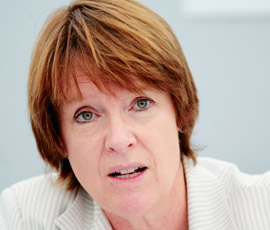MPs seek assurances over dairy code of practice

DEFRA secretary Caroline Spelman (pictured) faces the prospect of being called before MPs to explain why it is taking so long to agree a code of practice between farmers and dairy processors.
The Environment, Food and Rural Affairs Committee said it was frustrating that ministers had spent 14 months insisting a voluntary code was the best way forward without reaching a deal.
Farm minister Jim Paice announced a framework agreement for a code had been agreed on Monday (23 July). But the finer details are yet to be thrashed out.
Mr Paice has asked farmers and processors to reach a full agreement by the end of August.
Committee chairwoman Anne McIntosh MP said: “In evidence to our committee last week, we heard firsthand how time is running out for many dairy farmers.
“We urge the government to secure the voluntary code as a matter of priority. If it cannot then legislation must be considered.
Ms McIntosh said the committee was delighted that talks on the code are going ahead.
But she added: “We will reserve the possible decision to invite the secretary of state before us in September if no formal decision is reached.”
The committee took evidence last week from NFU dairy chairman Mansel Raymond, Asda external affairs director Paul Kelly and Dairy Crest milk procurement director Mike Sheldon.
Ms McIntosh has now written to Mr Paice saying the committee remains “deeply concerned” about the ongoing crisis in the dairy sector.
The committee is seeking reassurance that a code will cover issues such as price, volume, timing of deliveries and duration.
“Contracts should make it clear under what conditions the contract can be terminated by either party,” the letter says.
“Exclusivity clauses should be discouraged to allow farmers to respond to market signals following the abolition of quotas.
“We do not suggest that all contracts must contain an explicit price or price formula as these could be overly restrictive, but contracts should set out the principles underpinning price and mutually agreed tolerances.”
Read more
For more on the milk price crisis, visit our dedicated page
